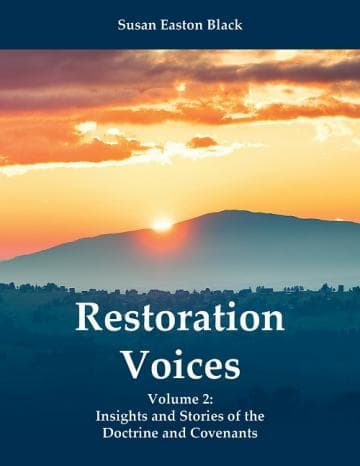Book
140 Chapters

“We had received a commandment to organize the Church; and accordingly we met together for that purpose, at the house of Mr. Peter Whitmer, Sen. on Tuesday, the sixth day of April, A.D., one thousand eight hundred and thirty,” wrote Joseph Smith.[1] Attending the foundational meeting were about fifty or sixty believers. David Whitmer reported, “Rooms were filled with members about 20 from Colesville, 15 from [the] Manchester Church and about 20 from around about Father Whitmers, about 50 members & the 6 Elders were present.”[2]
Those in attendance at the foundational meeting were greeted with hospitality before the meeting opened with prayer. When the assembled were asked if Joseph Smith and others should proceed to organize a church, the answer was affirmative. Joseph wrote:
Having opened the meeting by solemn prayer to our Heavenly Father, we proceeded, according to previous commandment, to call on our brethren to know whether they accepted us as their teachers in the things of the Kingdom of God, and whether they were satisfied that we should proceed and be organized as a Church according to said commandment which we had received. To these several propositions they consented by a unanimous vote.[3]
Joseph Smith then laid his hands upon the head of Oliver Cowdery and ordained him an elder. Oliver, in turn, ordained Joseph to the same office. They then “took bread, blessed it, and brake it with them; also wine, blessed it, and drank it with them.”[4] After partaking of the Lord’s Supper, hands were placed on the heads of those who had been previously baptized that they might receive the gift of the Holy Ghost and be confirmed members of the Church of Christ.
Of that sacred event Joseph Smith said, “The Holy Ghost was poured out upon us to a very great degree—some prophesied, whilst we all praised the Lord, and rejoiced exceedingly.”[5] Twenty-five-year-old Joseph was acknowledged as “a seer, a translator, a prophet, an apostle of Jesus Christ, an elder of the church through the will of God the Father, and the grace of your Lord Jesus Christ” (D&C 21:1). Ordinations to priesthood offices followed. The Prophet summarized the foundational meeting with the observation:
After a happy time spent in witnessing and feeling for ourselves the powers and blessings of the Holy Ghost, through the grace of God bestowed upon us, we dismissed with the pleasing knowledge that we were now individually members of, and acknowledged of God, “The Church of Jesus Christ,” organized in accordance with the commandments and revelations given by Him to ourselves in these last days, as well as according to the order of the Church as recorded in the New Testament.[6]
When the foundational meeting ended, “several persons who had attended the above meeting, became convinced of the truth and came forward shortly after, and were received into the Church,” wrote Joseph Smith. Among those who came forward and received baptism, Joseph penned, “My own father and mother were baptized, to my great joy and consolation; and about the same time, Martin Harris and Orrin Porter Rockwell.”[7]
[1] History, 1838–1856, volume A-1 [23 December 1805-30 August 1834], 37. Joseph Smith Papers.
[2] Edward Stevenson Collection, 1849–1922, Mss. 4806, Box 2, Folder 4, January 2, 1887. Church History Library.
[3] History, 1838–1856, 37. Joseph Smith Papers.
[4] History, 1838–1856, 37. Joseph Smith Papers.
[5] Smith, History of the Church, 1:78; compare, Joseph Smith, Manuscript History, Book A-1, 36.
[6] History, 1838–1856, 37. Joseph Smith Papers.
[7] History, 1838–1856, 37. Joseph Smith Papers.
Book
140 Chapters
Items in the BMC Archive are made publicly available for non-commercial, private use. Inclusion within the BMC Archive does not imply endorsement. Items do not represent the official views of The Church of Jesus Christ of Latter-day Saints or of Book of Mormon Central.